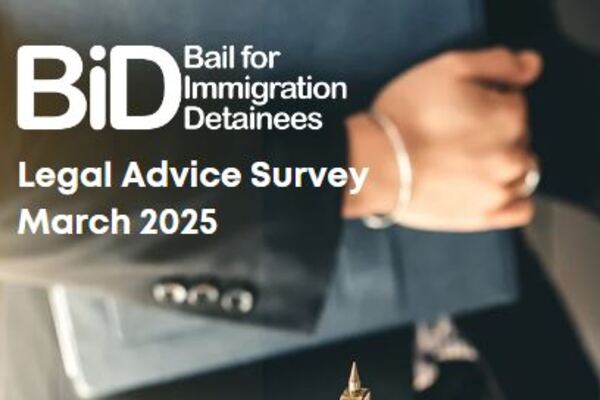BID, along with nineteen signatories, have written to the Secretary of State for Justice raising serious concerns about it's ‘Human Rights Act Reform: A Modern Bill of Rights’ consultation.
The consultation documents, which seek views on the Governments proposals for Human Rights Reform, are extremely concerning due to the the partial and misleading use of case studies and statistics as well as the the partisan framing of questions which undermine the entire process.
The letter demands the urgent review and correction of the documents with a corresponding extension of the deadline for the consultation.
Read the letter below or click here to download it.
Rt. Hon Dominic Raab
Secretary of State for Justice,
102 Petty France
London
SW1H 9AJ
United Kingdom
3rd March 2022
Dear Mr. Raab
I write to raise serious concerns over the way that information has been presented during the Ministry of Justice’s consultation exercise, ‘Human Rights Act Reform: A Modern Bill of Rights’.
I am requesting that the Ministry of Justice issue urgent corrections to the consultation documents before the conclusion of the Consultation process, with a corresponding extension of the deadline for the consultation.
There are three areas of concern: (i) the partial and misleading use of case studies; (ii) the
misleading use of statistics; and (iii) the partisan framing of questions in the short consultation paper.
(i) Misleading use of case studies
The case studies deployed after paragraph 131 of the full December 2021 Consultation Paper (‘the Consultation Paper’), in support of the government’s proposed changes to deportation law, are described in a highly selective manner. Key facts are excluded:
- The summary of the case of AD (Turkey) correctly states that the appeal in that case was allowed notwithstanding a prison sentence of four years or more imposed for a serious offence (grievous bodily harm). However, the striking facts found by the specialist Tribunals leading to that appeal being allowed are omitted from the account in the Consultation Paper. For example, there is no reference to the clearly critical facts found by the Tribunals that the appellant’s “actions in committing the index offence were very much out of character and he has expressed remorse; that he was a model prisoner and was on unconditional bail; that he has lived in the UK for over 30 years and is socially and culturally integrated in the UK; that he has no ties with Turkey and would have to start anew if sent there; that he has a genuine and subsisting relationship with his wife” of 31 years, a British Citizen with no ties to Turkey who suffered anxiety and depression and had undergone repeated surgeries for cancer, for whom relocation to Turkey would be unduly harsh. Nor is there any reference to the facts found by the Tribunals “that the claimant’s adult son, R, is unwell with Crohn’s disease and is reliant on his father for assistance” and accepted expert evidence showing that the appellant (a permanent resident since 1994) posed a low risk of reoffending and ran a company employing others.
- The case of OO (Nigeria) is cited as another instance of an appeal allowed on Article 8 ECHR grounds notwithstanding a prison sentence totalling four years. Once again, the Consultation Paper, while citing the offences committed and length of sentence, omits the key facts that gave rise to the Tribunal’s finding in the individual’s favour. The appellant in OO was born in the UK, had resided in the UK since childhood and had “known only life in” the UK; was socially and culturally integrated to the UK; six years elapsed between the offence and the hearing before the First-tier Tribunal, during which time the appellant had made “every effort” and had been rehabilitated.
The presentation of caselaw in this way is misleading. It is of particular concern that this emanates from the Secretary of State for Justice. I note to similar effect that in a speech at the Conservative Party Conference on 5th October 2021, you selectively cited a case dating from over a decade ago, to claim that deportation appellants were ‘abusing’ the system. You failed to mention that this case was determined under the old statutory regime for deportation, predates changes made in 2014 to the legislative framework governing deportation (that now allow for deportation unless this involves ‘excessive cruelty’/is ‘unduly harsh’), and involved a man who had arrived in the UK aged four and was to all intents and purposes British.
(ii) Misleading use of statistics
The Consultation Paper (in the box under paragraph 150) cites data concerning the number of deportation appeals lodged and allowed on human rights grounds in support of the contention that “expanding human rights restrictions on the government’s ability to deport serious foreign offenders engages the government in costly litigation, and puts the public at additional risk by enabling dangerous criminals to frustrate the process” (our emphasis).
In fact, there has been no expansion of human rights restrictions on the government’s ability to deport serious foreign offenders in this period; rather, legislative changes introduced in 2014 have had the contrary effect, and have tightly restricted the circumstances in which foreign national offenders can succeed on Article 8 ECHR grounds. Because the dataset cited in the Consultation Paper is drawn from a period covering April 2008 to June 2021, the data obscures actual trends. As a Freedom of Information response to BID from the Home Office dated 14 December 2021 shows, there are in fact now far fewer appeals lodged on human rights grounds (and still far fewer allowed) in the deportation context than the figures cited in the consultation document might appear to suggest. In 2019, for example, 1548 deportation orders were served on non-EEA nationals, of whom 460 (29%) appealed; of those appeals, only 92 were allowed. In 2020, the figures were even more stark: of the 809 deportation orders served, only 124 (15%) had brought appeals (1).
(iii) Framing of questions
The tone and framing of proposals is unusually partisan in the documents for this consultation and this is particularly problematic in the short consultation paper (“Bringing the Human Rights Act up to date”), published on 24th February 2022 (“the short paper”).
The short paper contains emotive assertions, presenting highly contentious assertions as fact. For example, “sometimes the Human Rights Act protects the rights of a few people without looking at how this affects others” and “the UK courts should be more able to make decisions without having to decide the same as the European Court”.
The omission of relevant information, selective use of data and partisan framing of the questions undermines the consultation process. That approach falls below the standard that should be expected from any Government consultation, let alone one from the Ministry of Justice on an issue of high constitutional importance.
For all those reasons, I request that you please revise your consultation documents to ensure that these cite caselaw and use data accurately and to ensure that the questions are framed in a way that elicits meaningful, properly informed responses. I ask also that the consultation deadline is extended to enable that to happen.
Yours sincerely
Pierre Makhlouf, Legal Director, Bail for Immigration Detainees
Brian Dikoff, Legal Organiser, Migrants Organise
Mishka Pillay, Campaigns and Communications Officer, Allies for Justice
Bella Sankey, Director, Detention Action
Rosalyn Akar Grams, Managing Director of Legal Practice and Children’s Rights, Coram
Children’s Legal Centre
Dr Edie Friedman, Executive Director, The Jewish Council for Racial Equality (JCORE)
Gisela Valle, Director, Latin American Women's Rights Service (LAWRS)
Emma Ginn, Director, Medical Justice
Elli Free, Director, Room to Heal
Sam Grant, Head of Policy and Campaigns, Liberty
Satbir Singh, Chief Executive, The Joint Council for the Welfare of Immigrants
Dr Rosie Riley, CEO, VITA
Fizza Qureshi, Chief Executive, Migrants' Rights Network
Peter Wieltschnig, Policy & Networks Officer, Focus on Labour Exploitation
William Gomes, Director, the William Gomes podcast
Naomi Webb, Executive Director, Good Chance Theatre
Christopher Desira, Seraphus
Eleanor Brown, Managing Director, CARAS
Glen Hodgetts - Barrister at Law, Head of Chambers, Great George Street Chambers
Vanessa Delgado (Consultant Solicitor)
(1) Of those 124 appeals brought in 2020, 14 had been allowed at the time of the FOIA response (the figures on appeals allowed will not be conclusive- it is likely that certain of the 2020 deportation orders are still subject to appeal).









